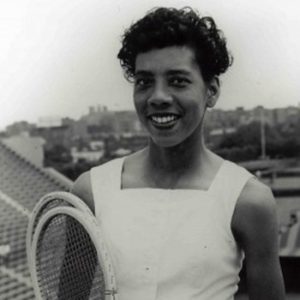
Althea Gibson
*Althea Gibson was born on this date in 1927. She was a Black tennis and golfer.
From Silver, South Carolina, the family moved to Harlem in New York City when she was three. Growing up there, Gibson disliked attending school so much that she often skipped classes. What Gibson liked was playing sports; at first, basketball was her favorite, then paddle tennis. Then a friendly musician gave her a tennis racket, and she immediately took to the game. She quit high school, not because of tennis but because she couldn't stand classes. She began competing in girls' tournaments under the auspices of the American Tennis Association, which was almost all black.
In 1946, she attracted the attention of two tennis-playing doctors, Hubert Eaton of North Carolina and Robert W. Johnson of Virginia, who were active in the Black tennis community. Soon-to-be welterweight champion Sugar Ray Robinson and his wife, who had befriended Gibson, advised her to go south. She did. Each doctor took her into his family, Eaton during the school year and Johnson during the summer. Not only did they provide tennis instruction, but they also straightened her out academically.
She returned to high school for her last three years and graduated in 1949 in Wilmington, North Carolina. As the two-time winner of the national Black women's tennis championship, Gibson thought she had a good case for being admitted to the 1950 U. S. Nationals.
But it appeared she would be shut out again until Alice Marble, a four-time event winner, advanced her cause in the July 1950 "American Lawn Tennis" magazine issue. "If Althea Gibson represents a challenge to the present crop of players, then it's only fair that they meet this challenge on the courts," Marble wrote.
In her celebrated debut at the 1950 U. S. Nationals, Gibson beat Barbara Knapp in straight sets. Her second-round match on the grass of Forest Hills was against Louise Brough, who had won the previous three Wimbledon’s. After being beaten 6-1 in the first set, Gibson recovered to win the second set 6-3 and led 7-6 in the third when a thunderstorm struck, halting the match. When it resumed the next day, Gibson dropped three straight games to lose the match.
It took Gibson a while to adjust to the stronger competition. She also remained unwelcome at some clubs where tournaments were held. She was ranked number 9 among American women in 1952, but it wasn't until four years later that Gibson displayed the game of a player ready to move into the first echelon. She won her first major in 1956, the French championships on the clay courts in Paris, the first Black person to do so.
The next year, she made more history by winning Wimbledon and the U. S. Nationals, the first Black to win either. Even while winning tournaments, she was denied rooms at hotels. One refused to book reservations for a luncheon in her honor. She said she didn't care. "I tried to feel responsibilities to Negroes, but that was a burden on my shoulders," she said in 1957. Including six doubles titles, she won 11 Grand Slam events on her way to the International Tennis Hall of Fame and the International Women's Sports Hall of Fame.
Her singles record at the Grand Slams events was an impressive 53-9, 16-1 at Wimbledon, 27-7 at the U. S., 6-0 at the French, and 4-1 at the Australian. One year she earned a reported $100,000 in conjunction with playing a series of matches before Harlem Globetrotter basketball games. There was no professional tennis tour in those days. Gibson turned to the pro golf tour for a few years, but she didn't excel. She tried playing a few events after open tennis started in 1968, but she was in her 40s and too old to beat her younger opponents.
She worked as a tennis teaching pro after she stopped competing. Gibson has turned into a recluse in her well-kept garden apartment in East Orange, New Jersey; according to sources, she is suffering in silence from a series of strokes and ailments brought on by a disease she is said to have described as "terminal." "If it hadn't been for her," says Billie Jean King, winner of 12 Grand Slam singles titles, "it wouldn't have been so easy for Arthur (Ashe) or the ones who followed."
Althea Gibson died of respiratory failure on September 29, 2003, at a hospital in East Orange, N.J.